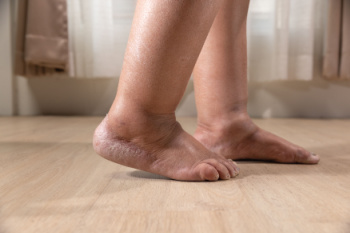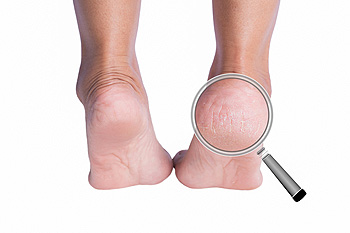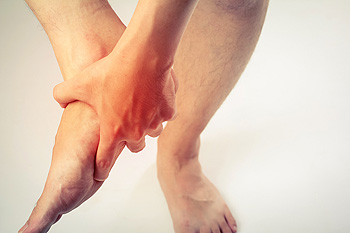Items filtered by date: December 2024
Managing a Ruptured Achilles Tendon

A ruptured Achilles tendon is a significant injury where the thick tendon connecting the calf muscles to the heel tears, often during sudden, forceful movements. This injury is most common in men between 30 and 40 years of age, and frequently occurs during sports that involve explosive movements or quick direction changes, such as tennis, football, pickleball, and basketball. Patients often describe hearing a snapping or popping sound at the time of injury, followed by sharp pain and swelling at the back of the ankle. Walking becomes difficult, and standing on tiptoe is typically impossible. Early diagnosis is essential to determine the extent of the injury and the best course of treatment. A podiatrist can provide a thorough assessment and recommend appropriate care, which may include immobilization or supportive devices like walking boots. Addressing the injury promptly can improve recovery outcomes and help prevent further complications in the foot or ankle. If you have injured your Achilles tendon, it is suggested that you schedule an appointment with a podiatrist for an exam, diagnosis, and treatment.
Achilles tendon injuries need immediate attention to avoid future complications. If you have any concerns, contact the foot specialists of Podiatry Associates of Belleville. Our doctors can provide the care you need to keep you pain-free and on your feet.
What Is the Achilles Tendon?
The Achilles tendon is a tendon that connects the lower leg muscles and calf to the heel of the foot. It is the strongest tendon in the human body and is essential for making movement possible. Because this tendon is such an integral part of the body, any injuries to it can create immense difficulties and should immediately be presented to a doctor.
What Are the Symptoms of an Achilles Tendon Injury?
There are various types of injuries that can affect the Achilles tendon. The two most common injuries are Achilles tendinitis and ruptures of the tendon.
Achilles Tendinitis Symptoms
- Inflammation
- Dull to severe pain
- Increased blood flow to the tendon
- Thickening of the tendon
Rupture Symptoms
- Extreme pain and swelling in the foot
- Total immobility
Treatment and Prevention
Achilles tendon injuries are diagnosed by a thorough physical evaluation, which can include an MRI. Treatment involves rest, physical therapy, and in some cases, surgery. However, various preventative measures can be taken to avoid these injuries, such as:
- Thorough stretching of the tendon before and after exercise
- Strengthening exercises like calf raises, squats, leg curls, leg extensions, leg raises, lunges, and leg presses
If you have any questions please feel free to contact our office located in Belleville, NJ . We offer the newest diagnostic tools and technology to treat your foot and ankle needs.
It's Time for Beautiful Feet
Daily Yoga Foot Stretches for Better Flexibility

Incorporating yoga foot stretches into your daily routine can greatly improve flexibility, strength, and overall foot health. One simple stretch involves sitting on the floor and stretching your legs out in front of you. Reach for your toes, gently pulling them back toward your body to stretch the soles and calves. Another effective stretch is the downward-facing dog, which lengthens the hamstrings, calves, and arches of the feet. For a more targeted stretch, try the toe stretch, where you kneel and gently stretch your toes by placing your feet flat on the floor and sitting back onto your heels. Lastly, the seated foot stretch involves sitting with one leg crossed over the other and using your hands to gently pull the toes back, stretching the top of the foot. If you have developed foot pain, it is suggested that you consult a podiatrist who can treat various foot conditions, and guide you on additional effective foot stretches.
Why Stretching Is Important for Your Feet
Stretching the feet is a great way to prevent injuries. If you have any concerns with your feet consult with the foot specialists from Podiatry Associates of Belleville. Our doctors will assess your condition and provide you with quality foot and ankle treatment.
Stretching the Feet
Stretching the muscles in the foot is an important part in any physical activity. Feet that are tight can lead to less flexibility and make you more prone to injury. One of the most common forms of foot pain, plantar fasciitis, can be stretched out to help ease the pain. Stretching can not only ease pain from plantar fasciitis but also prevent it as well. However, it is important to see a podiatrist first to determine if stretching is right for you. Podiatrists can also recommend other ways to stretch your feet. Once you know whether stretching is right for you, here are some excellent stretches you can do.
- Using a foam roller or any cylindrical object (a water bottle or soda can will do), roll the object under your foot back and forth. You should also exert pressure on the object. Be sure to do this to both feet for a minute. Do this exercise three times each.
- Similar to the previous exercise, take a ball, such as a tennis ball, and roll it under your foot while seated and exert pressure on it.
- Grab a resistance band or towel and take a seat. If you are using a towel, fold it length wise. Next put either one between the ball of your foot and heel and pull with both hands on each side towards you. Hold this for 15 seconds and then switch feet. Do this three times for each foot.
- Finally hold your big toe while crossing one leg over the other. Pull the toe towards you and hold for 15 seconds. Once again do this three times per foot.
It is best to go easy when first stretching your foot and work your way up. If your foot starts hurting, stop exercising to ice and rest the foot. It is advised that you then see a podiatrist for help.
If you have any questions, please feel free to contact our office located in Belleville, NJ . We offer the newest diagnostic and treatment technologies for all your foot care needs.
Common Reasons for Swollen Feet

Swollen feet are a common issue caused by various factors. Long flights or extended road trips where you sit for long periods can lead to poor circulation, causing fluid to build up in the feet and ankles. Consuming too much salt can also contribute to swelling as excess sodium causes the body to retain water. Another cause of swollen feet is not moving enough, particularly if you are sedentary for long stretches, which can hinder blood flow. Additionally, new medications, especially those for high blood pressure, diabetes, or pain, can sometimes cause swelling as a side effect. It is important to stay active, reduce salt intake, and elevate your feet to help reduce swelling. If your feet have become swollen, it is suggested that you consult a podiatrist who can determine what the reason is and offer effective relief and management tips.
Swollen feet can be a sign of an underlying condition. If you have any concerns, contact the foot specialists of Podiatry Associates of Belleville. Our doctors can provide the care you need to keep you pain-free and on your feet.
Swollen feet are a common ailment among pregnant women and people who stand or sit for extended periods. Aging may increase the possibility of swollen feet and patients who are obese often notice when their feet are swelling too. There may be medical reasons why swollen feet occur:
- Phlebitis - A condition that causes the veins to become inflamed and can also cause leg pain.
- Liver disease - This may lead to low blood levels of albumin which is a protein. This can cause fluid in the blood to pass into the tissues and several areas of the body can become swollen.
- Heart failure - When the heart doesn’t pump properly the blood that is normally pumped back to the heart can pool in the veins of the legs causing swollen feet.
- Kidney disease - One of the main functions of the kidneys is releasing excess fluid in the body. This type of condition can make it difficult for the kidneys to function properly, and as a result the feet may become swollen.
- Deep-vein thrombosis (DVT)- This is a serious condition where blood clots form in the veins of the legs. They can block the return of blood from the legs to the heart which may cause the feet to swell. It is important to be treated by a podiatrist if this condition is present.
Swollen feet can also be caused by bone and tendon conditions, including fractures, arthritis, and tendinitis. Additionally, there may be skin and toenail conditions and an infection may cause the feet to swell. Patients who take medicine to treat high blood pressure may be prone to getting swollen feet.
Many patients elevate their feet to help relieve the swelling and this is generally a temporary remedy. When a podiatrist is consulted the reason behind the swelling can be uncovered and subsequently treated.
If you have any questions please feel free to contact our office located in Belleville, NJ . We offer the newest diagnostic tools and technology to treat your foot and ankle needs.
Reasons and Treatment for Cracked Heels

Cracked heels are a common foot issue that can cause discomfort and pain. The main reason for cracked heels is dry skin, which can be exacerbated by factors such as standing for long periods, wearing open-back shoes, or exposure to harsh weather conditions. Other causes include obesity, diabetes, and certain skin conditions like eczema. When the skin loses moisture and elasticity, it can become thickened and eventually crack, leading to pain and potential infection. A podiatrist can treat cracked heels by thoroughly examining the feet and providing professional care. Treatment may involve debridement to remove dead skin, moisturizing therapies, and recommending proper footwear. Podiatrists may also suggest orthotics or other interventions to address any underlying causes, ensuring the feet heal properly and preventing future cracks. If you have developed cracked heels, it is suggested that you consult a podiatrist who can offer prescribed medication as part of a successful treatment regime.
If the skin on your feet starts to crack, you may want to see a podiatrist to find treatment. If you have any concerns, contact the foot specialists from Podiatry Associates of Belleville. Our doctors can provide the care you need to keep you pain-free and on your feet.
Cracked Heels
It is important to moisturize your cracked heels in order to prevent pain, bleeding, and infection. The reason cracked heels form is because the skin on the foot is too dry to support the immense pressure placed on them. When the foot expands, the dry skin on the foot begins to split.
Ways to Help Heal Them
- Invest in a good foot cream
- Try Using Petroleum Jelly
- Ease up on Soaps
- Drink Plenty of Water
Ways to Prevent Cracked Heels
- Moisturize After Showering
- Skip a Shower
- Keep Shower Water Lukewarm
- Don’t Scrub Your Feet
If you are unsure how to proceed in treating cracked heels, seek guidance from a podiatrist. Your doctor will help you with any questions or information you may need.
If you have any questions, please feel free to contact our office located in Belleville, NJ . We offer the newest diagnostic and treatment technologies for all your foot care needs.
Common Causes of Heel Pain

Heel pain is a complex issue that can disrupt daily activities and exercise routines. Three prevalent causes include plantar fasciitis, bone spurs, and Sever’s disease. Plantar fasciitis involves inflammation of the plantar fascia, a thick band of tissue running along the bottom of the foot, typically causing pain near the heel. Bone spurs are bony growths that develop on the heel, often resulting from prolonged stress on the foot and sometimes causing sharp pain. Sever's disease, most common in children and adolescents, is an inflammation of the growth plate in the heel, resulting from repetitive stress during periods of rapid growth. If you suffer from persistent heel pain, it is suggested that you visit a podiatrist who can properly diagnose heel pain and create a tailored treatment plan, which may include targeted exercises and orthotic support to alleviate pain and support healing.
Many people suffer from bouts of heel pain. For more information, contact the foot specialists of Podiatry Associates of Belleville. Our doctors can provide the care you need to keep you pain-free and on your feet.
Causes of Heel Pain
Heel pain is often associated with plantar fasciitis. The plantar fascia is a band of tissues that extends along the bottom of the foot. A rip or tear in this ligament can cause inflammation of the tissue.
Achilles tendonitis is another cause of heel pain. Inflammation of the Achilles tendon will cause pain from fractures and muscle tearing. Lack of flexibility is also another symptom.
Heel spurs are another cause of pain. When the tissues of the plantar fascia undergo a great deal of stress, it can lead to ligament separation from the heel bone, causing heel spurs.
Why Might Heel Pain Occur?
- Wearing ill-fitting shoes
- Wearing non-supportive shoes
- Weight change
- Excessive running
Treatments
Heel pain should be treated as soon as possible for immediate results. Keeping your feet in a stress-free environment will help. If you suffer from Achilles tendonitis or plantar fasciitis, applying ice will reduce the swelling. Stretching before an exercise like running will help the muscles. Using all these tips will help make heel pain a condition of the past.
If you have any questions please contact our office located in Belleville, NJ . We offer the newest diagnostic and treatment technologies for all your foot and ankle needs.
